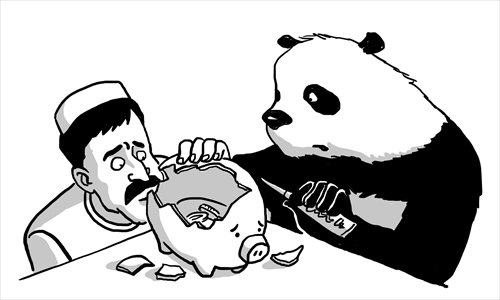Can China be a winner in Afghanistan?

As the date of the US troop withdrawal from Afghanistan approaches, the country's future raises increasingly wide concerns.
Some hold that US influence will fade out and China will come to play a key role in Afghanistan, and that as long as Afghanistan's situation stabilizes, China can benefit from its investments there.
In US Congress, some members have stated that US soldiers are risking their lives while China will effortlessly reap the fruits.
But others believe that the US will transfer the burden to China after its withdrawal.
If China does not intervene, Afghanistan will fall into chaos again and endanger China's security; but if China intervenes, China's interests will also be damaged as it gets bogged down in the mountains.
China may not be the biggest winner in Afghanistan, but it will certainly not be the biggest loser. For China, there are two worst-case scenarios.
The first is one where the US stabilizes Afghanistan, establishes a steady government, and then builds frontline bases.
This way, the US could drive a wedge into Central Eurasia, and contain China from both sides.
This was one of the collateral strategic goals of the US entry into Afghanistan in 2001. However, Afghanistan has proved a strategic burden, not an asset, to the US, dissipating many of China's traditional security concerns.
The second scenario is one where Afghanistan falls into anarchy with the US exit, becoming a breeding ground for international terrorism and drug trade. This will pose serious nontraditional security challenges to China.
But the US exit may leave China facing many uncertainties in nontraditional security anyway. China will have to face a difficult strategic choice.
If it remains an onlooker, Afghanistan may be in turmoil and China may suffer; but if China intervenes actively, it may sink into mire like the US, and become the main target of international terrorism.
As a result, China should take the initiative in Afghan affairs, while avoiding the failure of US intervention.
The core of US intervention is to focus on military and security issues, rather than economic development and social reconstruction, to mainly rely on US troops and other foreign armies, supplemented by the mobilization of Afghan independent forces, and to give priority to the US and its allies.
As a result, Afghanistan depends heavily on the outside world, especially the West, and its own development is seriously lagging behind. China's future Afghan policy should primarily aim to establish a self-supporting, self-sustaining, and gradually developing Afghanistan.
In security, China needs to closely cooperate with the former occupation armies and Afghanistan's neighboring nations, and incorporate Afghanistan into platforms of regional cooperation, like the Shanghai Cooperation Organization.
The goals of each nation's Afghan policy contradict and sometimes conflict with each other. This can easily be used by extremists and will undermine the authority of Afghan central government.
If each nation's policy and security resources could be coordinated, international security resources could then be saved and security efficiency be improved.
In economic terms, China ought to help Afghanistan develop its financial capabilities through investments, and provide employment opportunities and infrastructure.
At present, the Afghan economic structure is extremely unsustainable, with external assistance exceeding the country's own GDP.
As government spending mainly relies on foreign aid, the Afghan government and army seem like puppets and mercenaries.
If China can mobilize various economic powers, utilize oil gas and mineral resources in Afghanistan, and help it establish relevant industrial chains, the security situation can be ultimately stabilized.
Afghan affairs are not only the business of China and the US. To simply compare the gains and losses of China and the US in Afghanistan is to see it only through the prism of the Sino-US conflict, which is not really in accordance with the two powers' interests in Afghanistan.
The author is an associate professor at the Center for American Studies of Fudan University. opinion@globaltimes.com.cn